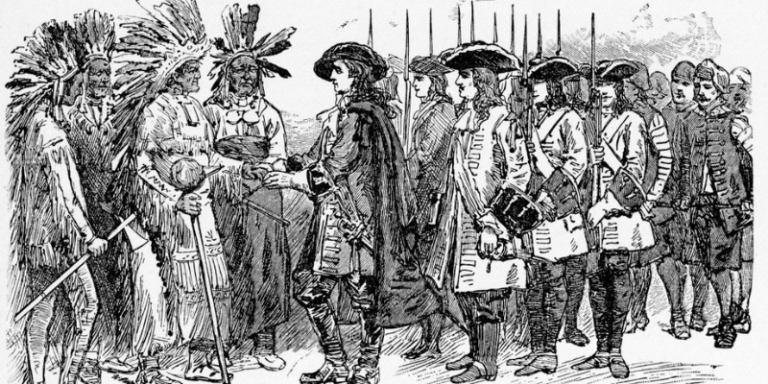Georgia: A Refuge for Debtors and the Poor
James Oglethorpe originally founded the Georgia colony to free up prison space in England.
By: Kelli Ballard | October 15, 2025 | 447 Words

James Oglethorpe as he shakes hands with a Native American chieftain soon after settling near what is now Savannah, Georgia. (Photo by Interim Archives/Getty Images)
On January 2, 1788, Georgia became the fourth state to ratify the Constitution and join the Union. As with most of America, Georgia was inhabited by native people long before any Europeans came to the land. Although there were various groups throughout the centuries, the two major tribes were the Cherokee from the northern part of the state and the Creek from the southern section.
Hernando de Soto was the first European to explore the land in 1540. Like many of his other explorations, de Soto and his men were looking for gold. They didn’t find the treasure but neither did they leave the land unscathed. Thousands of Native Americans contracted smallpox from the Spaniards and perished as a result. The Spanish explorers claimed the land that would become Georgia and established missions along the coast, but eventually left because they were easy prey for pirates.
Two hundred years later, in 1733, the British took over the area. James Oglethorpe led more than 100 colonists to the coast and established a settlement that eventually became Savannah. Oglethorpe had a vision of turning the land into a refuge for debtors and the poor, hoping to free up some of the prison space back in England. In honor of King George II of Great Britain, who had approved his charter, Oglethorpe named the colony Georgia.
The budding settlement became one of the largest slave areas. In 1793, inventor Eli Whitney toured a plantation belonging to Catharine Greene, the widow of military leader Nathanael Greene. During his visit, he tried to think of ways to make work easier for the cotton pickers and invented the cotton gin, a machine which quickly processed the crop. Ironically, the device prolonged the practice of slavery as the cotton industry became so profitable for plantation owners.
Georgia seceded from the Union when the Civil War broke out between the North and the South in 1861. Perhaps one of the most decisive battles was fought here in 1864 when Union General William Sherman marched from Atlanta to Savannah. He destroyed most everything in his path along the way, which severely hurt the South and drained their morale. The war ended less than six months later.
Interesting Facts
- Nancy Hart, a female patriot and spy, is rumored to have been at the Battle of Kettle Creek.
- Georgia was the site of the first full college for women in the country, the Georgia Female College, chartered in 1836 and now known as Wesleyan College.
- Georgia is the biggest U.S. state when it comes to filming movies and television programs.
- Georgia is known as the “Peach State,” apparently growing the best peaches in the nation.
















